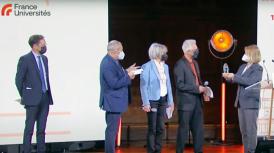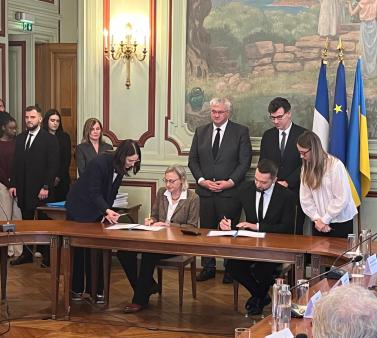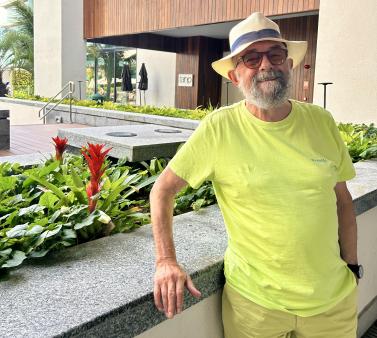
On January 13, 2022, the organization of France Universities (formerly the Conference of University Presidents) awarded Rennes 1 and Rennes 2 Universities with the ‘Universities Prize for Research’ during its Congress at the Grand Amphitheatre of the Sorbonne. The prize was given to Véronique Van Tilbeurgh, Professor at Rennes 2 University, and Luc Aquilina, Professor at Rennes 1 University, for an ambitious program through which Rennes universities and their partners are inventing collective intelligences that respect the balance between human activities and the environment: environmental intelligences.
The Common Environmental Intelligence Program was created in 2020 and combines the fields of environmental, social and digital sciences with the aim of building a link between science and society. The program's purpose is to implement solutions and better train the actors of change.
Supported by the UniR group, the two Rennes universities, three research institutions (CNRS, INRAE, Inria) and six other local higher education institutions (Institut Agro - Agrocampus Ouest, ENS Rennes, Sciences-Po Rennes, ENSCR, INSA Rennes and EHESP), the PIEC program is unique in that it constitutes a common link to the Maison des Sciences de l'Homme en Bretagne (MSHB) and the Observatoire des Sciences de l'Univers de Rennes (OSUR). The PIEC is animated by more than a hundred researchers and teacher-researchers from 22 research centers. Together, they are experimenting with new forms of research while promoting interdisciplinary approaches, mixing environmental sciences, humanities, social sciences and digital sciences. In so doing, the program makes a strong contribution to the scientific approach towards major societal transitions and, in particular, the environmental transition.
In a region marked by intensive agricultural activity, this Rennes-based network constitutes a diversified and active research ecosystem focused on examining various ecological, climatic, agricultural and social transitions. The PIEC is involved in three pivotal projects: the Armorique workshop area, the Terra Forma Equipex led by Rennes, and the "Living laboratories for human-environment interactions" of Glaz CPER.
The PIEC also includes nearly 20 research projects that are emblematic of the environmental intelligence approach: water resources, biodiversity of ecosystems and agro-ecosystems, green algae issues, the impact of climate change, territories and public policies, the co-construction of management within rural and peri-urban territories, the accessibility of models to managers, etc. This research is systematically co-constructed with non-scientific actors, citizens, elected officials, representatives of associations or entrepreneurs. The objective is to collectively find solutions to meet the challenges of the ecological transition by placing socio-environmental dynamics in sustainable trajectories.
The PIEC also focuses on the links between research and training through the creation of training modules that aim to transform traditional pedagogical approaches to constructive construction approaches and, in doing so, train students as solution providers for environmental transitions. These students will be better equipped to meet the demands of future employers. Together with researchers, they will help to create and implement solutions for the environmental transitions we are facing.




